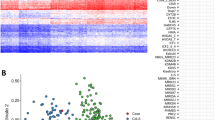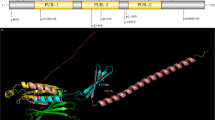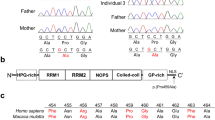Abstract
Verheij syndrome, also called 8q24.3 microdeletion syndrome, is a rare condition characterized by ante- and postnatal growth retardation, microcephaly, vertebral anomalies, joint laxity/dislocation, developmental delay (DD), cardiac and renal defects and dysmorphic features. Recently, PUF60 (Poly-U Binding Splicing Factor 60 kDa), which encodes a component of the spliceosome, has been discussed as the best candidate gene for the Verheij syndrome phenotype, regarding the cardiac and short stature phenotype. To date, only one patient has been reported with a de novo variant in PUF60 that probably affects function (c.505C>T leading to p.(His169Tyr)) associated with DD, microcephaly, craniofacial and cardiac defects. Additional patients were required to confirm the pathogenesis of this association and further delineate the clinical spectrum. Here we report five patients with de novo heterozygous variants in PUF60 identified using whole exome sequencing. Variants included a splice-site variant (c.24+1G>C), a frameshift variant (p.(Ile136Thrfs*31)), two nonsense variants (p.(Arg448*) and p.(Lys301*)) and a missense change (p.(Val483Ala)). All six patients with a PUF60 variant (the five patients of the present study and the unique reported patient) have the same core facial gestalt as 8q24.3 microdeletions patients, associated with DD. Other findings include feeding difficulties (3/6), cardiac defects (5/6), short stature (5/6), joint laxity and/or dislocation (5/6), vertebral anomalies (3/6), bilateral microphthalmia and irido–retinal coloboma (1/6), bilateral optic nerve hypoplasia (2/6), renal anomalies (2/6) and branchial arch defects (2/6). These results confirm that PUF60 is a major driver for the developmental, craniofacial, skeletal and cardiac phenotypes associated with the 8q24.3 microdeletion.
Similar content being viewed by others
Log in or create a free account to read this content
Gain free access to this article, as well as selected content from this journal and more on nature.com
or
References
Rauch A, Wieczorek D, Graf E et al: Range of genetic mutations associated with severe non-syndromic sporadic intellectual disability: an exome sequencing study. Lancet 2012; 380: 1674–1682.
de Ligt J, Willemsen MH, van Bon BW et al: Diagnostic exome sequencing in persons with severe intellectual disability. N Engl J Med 2012; 367: 1921–1929.
Gilissen C, Hehir-Kwa JY, Thung DT et al: Genome sequencing identifies major causes of severe intellectual disability. Nature 2014; 511: 344–347.
Kielkopf CL, Lücke S, Green MR. : U2AF homology motifs: protein recognition in the RRM world. Genes Dev 2004; 18: 1513–1526.
Hastings ML, Allemand E, Duelli DM, Myers MP, Krainer AR. : Control of pre-mRNA splicing by the general splicing factors PUF60 and U2AF(65). PLoS One 2007; 2: e538.
Verheij JB, de Munnik SA, Dijkhuizen T et al: An 8.35 Mb overlapping interstitial deletion of 8q24 in two patients with coloboma, congenital heart defect, limb abnormalities, psychomotor retardation and convulsions. Eur J Med Genet 2009; 52: 353–357.
Wells C, Spaggiari E, Malan V et al: First fetal case of the 8q24.3 contiguous genes syndrome. Am J Med Genet 2016; 170: 239–242.
Dauber A, Golzio C, Guenot C et al: SCRIB and PUF60 are primary drivers of the multisystemic phenotypes of the 8q24.3 copy-number variant. Am J Hum Genet 2013; 93: 798–811.
Neveling K, Feenstra I, Gilissen C et al: A post-hoc comparison of the utility of sanger sequencing and exome sequencing for the diagnosis of heterogeneous diseases. Hum Mutat 2013; 34: 1721–1726.
Helsmoortel C, Vandeweyer G, Ordoukhanian P, Van Nieuwerburgh F, Van der Aa N, Kooy RF. : Challenges and opportunities in the investigation of unexplained intellectual disability using family-based whole-exome sequencing. Clin Genet 2015; 88: 140–148.
Vandeweyer G, Van Laer L, Loeys B, Van den Bulcke T, Kooy RF. : VariantDB: a flexible annotation and filtering portal for next generation sequencing data. Genome Med 2014; 6: 74.
Hennekam RC, Biesecker LG. : Next-generation sequencing demands next-generation phenotyping. Hum Mutat 2012; 33: 884–886.
Skouloudaki K, Puetz M, Simons M et al: Scribble participates in Hippo signaling and is required for normal zebrafish pronephros development. Proc Natl Acad Sci USA 2009; 106: 8579–8584.
Bernier FP, Caluseriu O, Ng S et al: Haploinsufficiency of SF3B4, a component of the pre-mRNA spliceosomal complex, causes Nager syndrome. Am J Hum Genet 2012; 90: 925–933.
Boycott KM, Dyment DA, Sawyer SL, Vanstone MR, Beaulieu CL : Identification of genes for childhood heritable diseases. Annu Rev Med 2014; 65: 19–31.
Acknowledgements
We thank the patients and their families involved in the study, the University of Burgundy Centre de Calcul (CCuB) for technical support and management of the informatics platform. The Regional Council of Burgundy and the Centre Hospitalo-Universitaire de Dijon supported this work (PARI 2014). Grant supports were NF-CZ11-PDP-3-003-2014, NT/14200 and 00064203. We thank Philip Bastable from the ‘Pôle de Recherche’ of Dijon University Hospital for a helpful review of this article.
Author information
Authors and Affiliations
Corresponding author
Ethics declarations
Competing interests
The authors declare no conflict of interest.
Rights and permissions
About this article
Cite this article
El Chehadeh, S., Kerstjens-Frederikse, W., Thevenon, J. et al. Dominant variants in the splicing factor PUF60 cause a recognizable syndrome with intellectual disability, heart defects and short stature. Eur J Hum Genet 25, 43–51 (2017). https://doi.org/10.1038/ejhg.2016.133
Received:
Revised:
Accepted:
Published:
Issue date:
DOI: https://doi.org/10.1038/ejhg.2016.133
This article is cited by
-
Non-isolated tetralogy of fallot (TOF+): exome sequencing efficacy and phenotypic expansions
European Journal of Human Genetics (2025)
-
Novel PUF60 variant suggesting an interaction between Verheij and Cornelia de Lange syndrome: phenotype description and review of the literature
European Journal of Human Genetics (2024)
-
Targeting PUF60 prevents tumor progression by retarding mRNA decay of oxidative phosphorylation in ovarian cancer
Cellular Oncology (2024)
-
Early loss of Scribble affects cortical development, interhemispheric connectivity and psychomotor activity
Scientific Reports (2021)
-
Increased diagnostic and new genes identification outcome using research reanalysis of singleton exome sequencing
European Journal of Human Genetics (2019)



